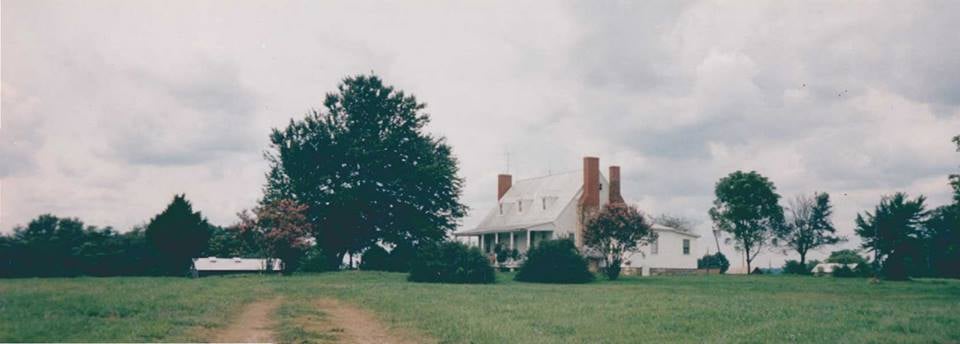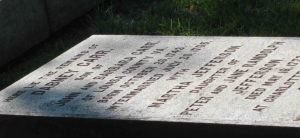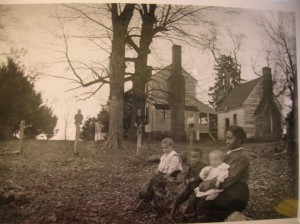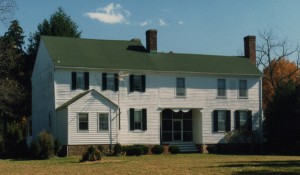For the second time in my life, I have the nagging sensation of not being at all in the market for a home in the middle of Virginia – but wishing that I were. Bear Castle, dilapidated and sad-looking (“livable but needs work”), is for sale (“Sold AS IS”).[1] Its interior cluttered with the incongruous collections of more than two and a half centuries’ habitation, its kitchen startlingly reminiscent of a mid-twentieth-century diner, the thousand-acre estate it once governed has been reduced to just over three acres that realtors suggest might be subdivided further still.
Built near the shore overlooking Lake Anna by 1732, it was the Louisa County home of my ancestral Carr family through the middle part of the eighteenth century. Of these, Dabney Carr (1743–1773) was born there soon after the house was built. He would go on to marry Martha, the sister of his best friend, classmate, and fellow legislator Thomas Jefferson. After Carr’s early death, his children were raised under the guidance of the Sage of Monticello in the 1770s and 1780s. What is the fate of Bear Castle to be?
In the fields of genealogy, archaeology, and history, little makes us cringe more than the irrevocable loss of artifacts, sites, and other elements of our cultural patrimony. The whole world has reviled the destruction of great historical sites in Iraq and Syria at the hands of the militant Islamic State group. The destruction they have visited upon the people in their path has been unprecedented, violent, and insupportable. Outrage at the assault on people, however, has been augmented by the destruction of the places we know had roles in making us and our cultures what we are today.
A species of this same sensation, occasioned by passivity rather than violence, without loss of life or hostility toward things sacred, is still felt by hundreds or thousands when it affects an historic family home like Bear Castle. We want so much to rescue it, to restore it, to make it whole. I felt this way once before, when another estate yanked into the present from the annals of Virginia history and my own genealogy was offered for sale: Tusculum, which my ancestors David and Elizabeth Crawford built in Amherst County in the mid-1700s.[2]
Their progeny included great-grandson William Harris Crawford (1772–1834), a U.S. Secretary of War, Secretary of the Treasury, and later presidential candidate, and great-great-grandson and U.S. Secretary of War George Walker Crawford (1798–1872). Tusculum passed out of my lineage when David and Elizabeth’s daughter, Elizabeth, married planter and militia officer Captain James Martin. Seemingly safe, seemingly preserved, the house spent hundreds of years in careful use beside the campus of Sweet Briar College, only to be disassembled in the 1990s and then offered for sale about two years ago.[3]
Tusculum may have been rescued, reportedly having been purchased by a local couple interested in its restoration.[4] Its provenance between the Sweet Briar College founder and his family, his successors, and the Department of Virginia Antiquities/Preservation Virginia gave it a better opportunity to survive. Is there a similar future for Bear Castle? One must hope a buyer, a restorer, sees a greater cultural patrimony in a home of great interest to one family’s descendants.
Notes
[1] The realtor’s listing is here.
[2] The Crawfords head the Crawford-Fletcher family chart of those who owned or resided at Tusculum.
[3] “Tusculum Available for Purchase (some assembly required),” Preservation Virginia, 27 December 2013.
[4] “Dismantled Home Owned by Sweet Briar College Will Be Reconstructed,” The Roanoke Times, 30 May 2014.
Share this:
About Christopher Carter Lee
Christopher Carter Lee completed undergraduate studies in international relations at Georgetown University in Washington, D.C., where he focused on culture and politics. He previously worked in foreign policy research, special projects and development for a U.S. Senate office, and as a political consultant, appearing on CNN's Crossfire. More recently, he built his own hired genealogical research practice while consulting in program development before joining NEHGS Research Services. He holds a Certificate in Genealogical Research from Boston University and has extensive knowledge of Maryland, Virginia, Southern U.S., and Southeastern American Indian genealogy, the Catholic Church in North America, and expertise in Italian, French, Polish, Russian, and other European research, nobility, heraldry, and history.View all posts by Christopher Carter Lee →



